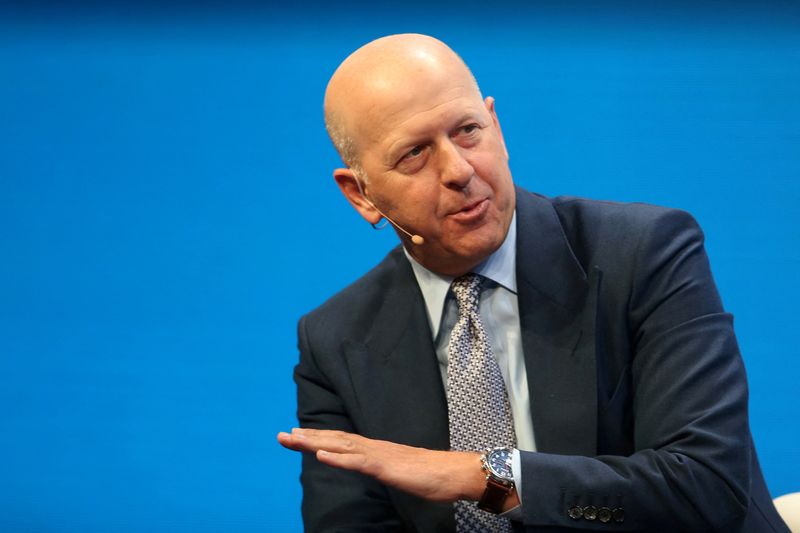By Saeed Azhar
NEW YORK (Reuters) -Goldman Sachs Group Inc's Chief Executive David Solomon faces a reality check from investors on Tuesday as he presents plans to reach key financial goals.
At only the second investor day in Goldman's 154-year history, shareholders will gather in downtown Manhattan to assess the Wall Street giant's roadmap after the high-profile flop of its consumer business, Marcus.
"It's a pretty important investor day," said Mike Cronin, investor director at fund manager abrdn, which owns a stake in the bank.
While Cronin said that the bank's leadership could get the job done, "there's definitely some debate about the path forward here, just given some of the missteps" and the gap between Goldman's promises and what it has delivered.
Investors will also judge whether the company can hit its target for return on tangible equity (ROTE), a measure of performance that compares profit versus shareholder equity.
Last year, its ROTE dropped to 11%, lagging peers and falling short of analysts expectations. That compares with 24.3% in 2021, a blockbuster year, reflecting how volatile Goldman's earnings can be.
The company needs to provide a "credible plan" to reach the medium-term target of 15% to 17%, Cronin said.
Solomon's performance will also be scrutinized. The consumer business that he championed lost $3 billion in almost three years and its operations are being probed by regulators. Marcus's woes also weighed on fourth-quarter earnings, which fell dramatically short of analyst expectations.
The results prompted investors and analysts to ask what comes next.
"We've set a clear strategic direction and we're looking forward to sharing more on our plans to continue to deliver for shareholders at investor day," said Tony Fratto, a company spokesman.
Solomon typically serves as Goldman's statesman, addressing conferences, speaking to media and posting a steady stream of photos to his LinkedIn page. But ahead of the Feb. 28 gathering, members of Goldman's top brass have joined in, granting rare press interviews to tout the company's performance. It's a big shift for a bank that has traditionally shunned attention.
In 2020, Solomon kicked off Goldman's inaugural investor day by telling participants they should feel free to "break into open applause."
The tone may be more somber this year after the company laid off about 3,200 employees. The CEO's pay was reduced 29% to $25 million for 2022 amid a challenging operating environment.
Goldman's stock has outperformed most top U.S. banks since Solomon took the helm in 2018, but trailed rival Morgan Stanley (NYSE:MS). Goldman shares edged 0.5% lower in pre-market trading on Friday, in line with peers.
Its board approved a share buyback of up to $30 billion, according to a regulatory filing on Friday.
Goldman trades at a price-to-book ratio, which measures the value of a company's stock, of 1.19, less than Morgan Stanley's 1.78 and JPMorgan Chase & Co (NYSE:JPM)'s 1.39.
The bank will probably miss its return target this year and next, said Mike Mayo, an analyst at Wells Fargo (NYSE:WFC). Its headcount and compensation expenses should be reduced, given the worsening economic outlook and sluggish dealmaking, he said. Losses from the consumer business will also be a drag on earnings.
COST CUTS
Goldman will probably need to make deeper cost cuts "given the ongoing uncertain revenue environment," Daniel Fannon, an analyst at Jefferies, wrote in a note.
The company needs to articulate a clearer path to profits for the newly-formed Platform Solutions unit, Fannon wrote. The division, which houses transaction banking, credit card and fintech operations, lost $1.67 billion in 2022.
David Fanger, analyst at Moody's (NYSE:MCO) Investors Service, wants more details on Goldman's move to slim down alternative investments that weighed on earnings.
Some analysts have suggested Goldman Sachs (NYSE:GS) should make a large acquisition in wealth management. That has been a winning strategy for rival Morgan Stanley, which benefited from more diverse revenue sources after buying brokerages Smith Barney and E*TRADE.
A deal could broaden Goldman's revenue beyond trading and investment banking, which can be buffeted by economic cycles. The two divisions, which were merged last year, comprised 69% of the firm's revenue in 2022.
Solomon has pushed back on deal talk, telling investors that there is a high bar for big transactions.
"This is certainly what the equity market wants them to do, but from a credit standpoint, it could be quite risky," because it is easier to build a business in-house, said Fanger at Moody's.
The investor day is also an opportunity for the company to address questions around Solomon's leadership after bad press, Mayo said.
Veteran bankers at Goldman often cite their long tenures as marks of confidence and continuity. But several presenters from the 2020 investor day have since left.
Among them are former Chief Financial Officer Stephen Scherr, who left to become the CEO of Hertz last year, and Gregg Lemkau, the previous co-head of investment banking who now manages the assets of Dell founder, Michael Dell, at MSD Capital. Veteran partner Tim O'Neill retired as a partner.
Marcus has also had a wave of departures. Swati Bhatia, who led the direct-to-consumer unit, stepped down last month. Two former heads of the business -- Omer Ismail and Harit Talwar -- also moved on in recent years.

Solomon, however, is planning to stay.
Addressing investors as a Florida conference this month, he said: "I am delighted to be here, and I promise you, I am delighted to come back to Florida in February next year too."